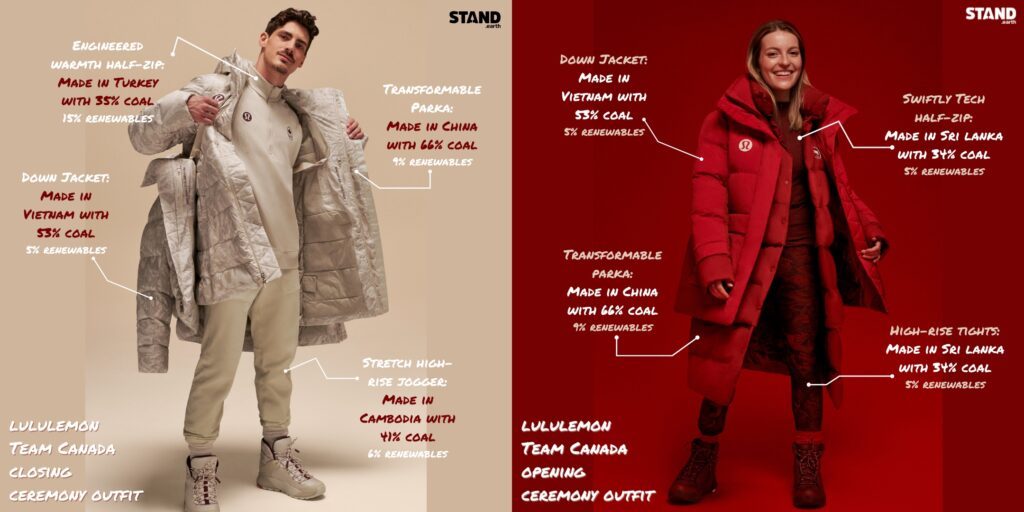
30 Jan 2022 By AWAY IN STYLE
Lululemon’s Team Canada Olympics outfits contribute to climate pollution, threaten future of winter games
Stand.earth analysis shows 48% of energy used to power Lululemon factories comes from coal
As the opening ceremony of the 2022 Winter Olympics nears, environmental advocacy organization Stand.earth is renewing its call for Canadian athleisure brand Lululemon to address its role in the climate crisis, saying the official outfitter for Team Canada must stop burning coal to power its factories and transition to renewable energy. To draw attention to their concerns, activists with Stand.earth plan to rally in Vancouver ahead of the Winter Olympics opening ceremony, which takes place on February 4.
“Becoming the official outfitter for Team Canada at one of the most beloved sports competitions in the world is an incredible moment for Lululemon. But it is ironic and reckless that Lululemon is using coal, the dirtiest fossil fuel, to make the clothing for Canada’s athletes, whose performance and participation in the Winter Olympics in the coming years will increasingly hinge on our success in tackling the climate crisis,” said Muhannad Malas, Senior Climate Campaigner at Stand.earth.
For more than a year, Vancouver, B.C.-based Stand.earth has called on Lululemon — one of the biggest, most profitable, and fastest growing sportswear brands in the world — to do better on climate change. Despite painting itself as a sustainability leader, the company has yet to commit to eliminating coal from its supply chains, and has done very little to advocate for the transition from coal to renewable energy in the countries where its factories are located — and where its Team Canada gear is made — including Vietnam, Cambodia, and China. Lululemon is notably missing from joint efforts signed by other fashion brands, including competitor Nike, to encourage fashion-producing countries to increase renewable energy.
In the coming decades, the multi-trillion dollar fashion industry’s greenhouse gas emissions are expected to increase drastically, surpassing other polluting industries such as aviation and shipping. Most fashion-producing countries rely heavily on a coal-powered electricity grid, which not only causes poor air quality that harms the health of people living nearby, but also contributes to global greenhouse gas emissions that worsen the effects of climate change, and in turn, threaten the very future of winter sports.

TEAM CANADA OUTFITS MADE WITH COAL
Stand.earth research examining U.S. imports of Lululemon products in 2020 found that approximately 48% of the electricity used by Lululemon factories in Vietnam, Cambodia, and China came from burning coal, and only 5% came from renewable energy. A closer look at Team Canada outfits show that many of the uniforms were made with coal. The red puffer parka that will be worn by athletes during the opening ceremony is made in China, while the closing ceremony white down jacket is made in Vietnam. Other items including the high-rise joggers are made in Cambodia. See an infographic here.
“As the Winter Olympics begin, Canadians everywhere must call on Lululemon to do more to ensure its clothes are not made with coal. As the climate crisis worsens, the health of our planet, and the future of winter sports, depends on the swift actions of companies like Lululemon and the entire polluting fashion industry to clean up its supply chains,” said Muhannad Malas, Senior Climate Campaigner at Stand.earth.
Stand.earth’s critique of Lululemon’s Team Canada Olympics outfits comes amid reports of harmful levels of air pollution in Beijing that are largely the result of coal pollution, and new research by Canadian climate scientists showing that if climate emissions continue to grow, 20 out of the 21 cities that hosted the Winter Olympics and Paralympics in the past, including Vancouver, will likely have less favorable conditions to host the games in the future.
BACKGROUND
Stand.earth’s research released in November 2020 ahead of COP26, the UN’s annual climate change conference, showed that despite Luluemon’s participation in the UN Fashion Industry Charter for Climate Action, and its commitment to reduce emissions in the coming decade, the company’s supply chain emissions actually increased in 2020.
Stand.earth’s Fossil Free Fashion Scorecard released in August 2021 benchmarked 47 top fashion companies on their efforts to tackle climate change. The report broadly failed the fashion industry on its efforts to address climate change, and gave Lululemon a D- for failing to take meaningful action to work with suppliers to increase renewable energy use in its supply chain, phase out coal usage, or advocate for or sourcing renewable energy for its factories.
Stand.earth’s Fossil Free Fashion campaign is calling for the fashion industry to addresses its climate emissions by eliminating its reliance on coal to power its manufacturing processes; engaging with governments in supply chain countries to gain better access to renewables; reducing fossil fuel-derived fabrics like polyester; and advocating for zero-emissions shipping and infrastructure. Since 2017, Stand.earth has been instrumental in encouraging major fashion brands like H&M, Levi’s and Mammut to make industry-leading climate pledges.
Learn more about Stand.earth’s Fossil Free Fashion Campaign at lulucoal.com.
/




